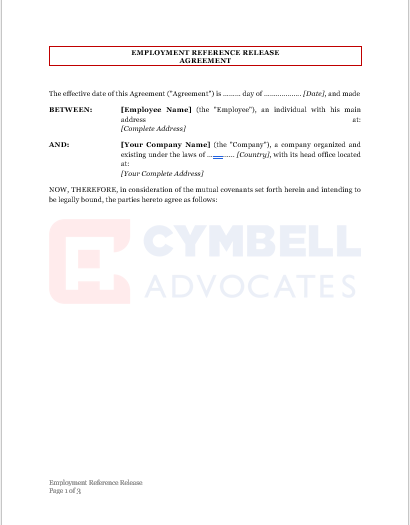Employment Reference Release Agreement
This is an agreement not to sue. It waives one’s right to sue and is intended to release your employer from any legal liability for claims you may have against it. A release may cover legal claims you didn’t know about when you signed, as long as the events underlying the claims already occurred. Generally, it does not place any legal obligation on an employer to provide a reference for an employee or ex-employee. The employer is entitled to refuse to provide one.
In exchange for Company’s agreement to depart from its general policy and to disclose additional employment-related information pursuant to the Employee request, the Employee agrees to release and discharge the Company and Company’s successors by signing the Employment Reference Agreement.
A detailed reference (or character reference) may include: answers to questions from the employer requesting the reference, details about your skills, ability and experience, details about your character, strengths and weaknesses relating to your suitability for the new role, how often you were off work, disciplinary details, the reason you left the job.
Note that the amount of detail included in the reference is up to the person who provides it, unless their employer has a specific policy on this. However, even if it is the case, references must not: be misleading, and should not include irrelevant personal information.
Finally, all details about the former employee, their role or performance must be fair and accurate. If opinions are provided, there should be evidence to support the opinion.
UGX50,000
Get your
Employment Reference Release Agreement
Instant Download
- Up-to-date document template
- Emailed to you instantly
- Suitable for startups and small-to-medium businesses
- Editable Word Document for you to modify
- Guidance notes included
UGX50,000
Drafted By An Advocate
- Document drafted by a lawyer
- Up to five business day turnaround
- Complimentary consultation with a lawyer to discuss changes and answer questions
- Fully personalised for your business and industry
- You are protected under our insurance
Affordable Fixed-Fee Price
Table of Contents
CM Advocates LLP Service Agreement template sets out:
- the terms of the relationship;
- the rights, responsibilities and obligations of the service provider and principal; and
- business processes such as payment, fees and invoicing.
- an unpaid invoices collection clause;
- a confidentiality clause;
- the ability for the service provider to be paid on commission;
- a subcontracting clause allowing the principal to restrict the ability of the service provider to subcontract the services;
- a sophisticated dispute resolution clause;
- a sophisticated workplace health and safety clause;
- a non-compete clause;
- a provision to protect your intellectual property and to allow the service provider to use it, if required; and
- additional provisions in related to the rights, responsibilities and obligations of the service provider and principal, particularly if agreement has been reached on particular issues.




